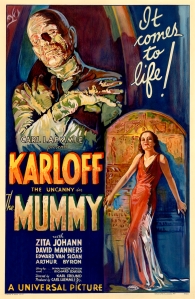
This has quickly become my favorite of the early Universal horror films, even ahead of "Dracula" and "Frankenstein." While those horror movies rely on high-concept monsters that have since become larger than life, "The Mummy" relies heavily on mood and atmosphere, where the empty darkness is just as much of a player as the titular mummy.
If you've seen the 1999 remake of "The Mummy" starring Brendan Fraser, then you know the basic premise - archeologists uncover an ancient tomb and disturb the slumber of a 3,700-year old mummy, who is now set on bringing is one true love back to life as well and silence anyone who gets in his way. While the remake is more action-oriented, the 1932 film focuses on the unnerving performance by horror-icon Boris Karloff, who gets far more screen time than he did in "Frankenstein," and gets to speak, always about his undying love for his Ankh-es-en-Amon.
While Karloff offers subdued control throughout the film, always using the archeologists to get what he needs and using his ancient magic to kill those who stand in his way, the lack of a score throughout most of the film and the dark lighting play just as big of a part. There is a general feeling of emptiness in "The Mummy," like the sands of Egypt, that provoke a sense of unease and mystery. Like you might be swallowed by the shifting sands at any moment. This is something other early Universal horror films lack, the atmosphere that nature is just as much of an enemy as the monster.
Overall, "The Mummy" not only sets the standards to every following supernatural archeological movie, but shows that silence and a creepy Karloff performance can be as terrifying as everything else. While it is a shorter film, around 75 minutes, every frame is oozing with atmosphere.
Final Grade: A

No comments:
Post a Comment